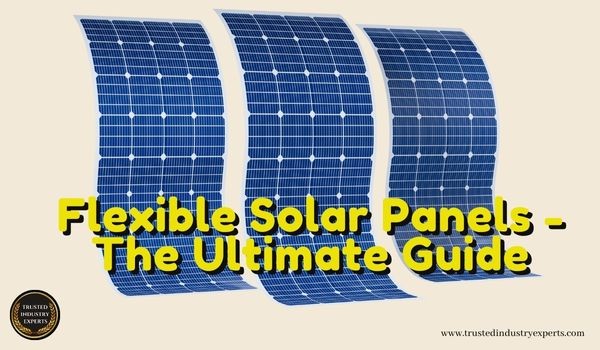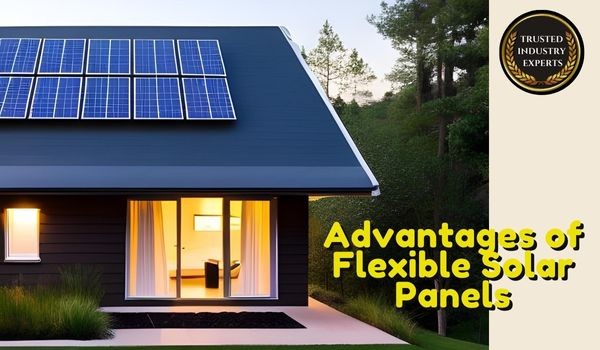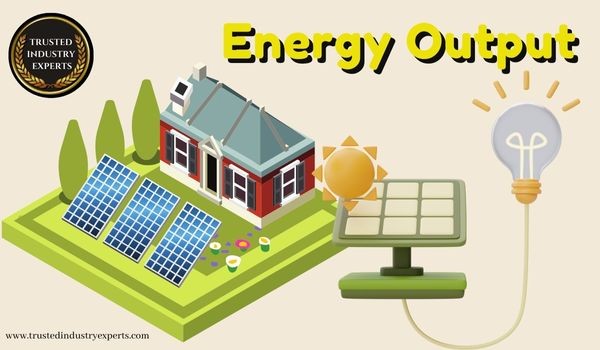Flexible Solar Panels – The Ultimate Guide

In recent years, the use of solar panels has gained immense popularity as a renewable and cost-effective source of energy. Flexible solar panels, in particular, have emerged as a game-changer, providing greater flexibility and versatility in their usage. In this article, we will provide a comprehensive guide to flexible solar panels, their uses, advantages, and limitations.
Flexible panels are quickly becoming the preferred choice for a wide range of solar projects due to their ease of installation and their ability to adhere to curved surfaces. In comparison to conventional solar panels, which require more effort and costly materials for installation, best flexible solar panels can often be installed with just a few tools in a fraction of the time and at a lower cost. Solar panels can be used in remote locations and unconventional applications that traditional solar modules would not be able to. Flexible solar panels have numerous applications, from camping trailers and marine vessels to roofs. They’re a popular choice for people and organizations who desire dependable renewable energy.
What are Flexible Solar Panels?
Thin-film solar panels, also called flexible panels, consist of light and flexible materials such as plastic and metal. Their bendable nature makes them ideal for applications where rigid panels are not suitable.
The best flexible solar panels are a great choice for those looking to harness the power of the sun but who don’t have access to traditional solar systems. Because they are lightweight, thin and flexible, they can be easily installed on any surface and require less infrastructure than other types of solar technology.
Traditional Panels Vs Flexible Models
In comparison to traditional panels, most flexible solar panels are able to bend and flex in a way that allows them to adhere to curved surfaces. This, coupled with their lightweight design, makes them the perfect choice for a variety of applications where standard solar panels would not be suitable. Additionally, thanks to their versatility and easy installation process, they can be used in remote locations or unconventional projects without requiring costly materials or additional labor. With a flexible solar panel kit, users can easily expand their use of renewable energy sources as it does not require high levels of technical knowledge or expensive tools. Flexible solar panels are an efficient and cost-effective way to use solar power.
Flexible panels come in two varieties: monocrystalline and polycrystalline.
Monocrystalline solar panels are made from single crystals, while polycrystalline solar panels are made up of multiple crystallites connected together. Thin film panels are also available and are composed of different layers of photovoltaic material laminated together, resulting in a lightweight panel that can be used in situations where traditional rigid panels may not be suitable.
Polycrystalline cells
Polycrystalline panels are particularly popular in the solar industry due to their relative affordability and ease of installation. By using multiple polycrystalline solar panels, homeowners can effectively utilize otherwise wasted roof space to generate sustainable energy, helping them save money on utility bills and reduce their carbon footprint. Additionally, polycrystalline panels are able to perform better in environments with low light levels, making them a great choice for those living in areas with less than ideal weather conditions. Solar panels are a great way to take advantage of the power of the sun, regardless of location or budget.
Monocrystalline Cells
Monocrystalline cells are often preferred for small solar projects as they can generate more energy from the same amount of space when compared to polycrystalline cells, making them an ideal choice for those looking to maximize their solar energy output. Additionally, monocrystalline cells are able to perform better in direct sunlight, making them a great choice for curved roof installations and other applications where the sun is not always shining directly on the panel. Flexibility in solar panels enables higher power generation than multiple polycrystalline panels combined, making them a more efficient solution. Installing a larger quantity of flexible solar panels enhances solar power production.
Thin Film
Flexible panels are a great alternative to traditional rigid solar panels as they offer greater versatility and ease of installation. These thin-film panels can be used on uneven surfaces, such as RV roofs, making them the perfect option for those looking to install flexible solar panels in hard-to-reach areas. Monocrystalline and polycrystalline crystalline panels are both popular options for those looking for reliable sources of renewable energy. Thin-film solar cells are lightweight and strong enough to weather harsh conditions while remaining easy to clean with just water. Their flexibility and affordability make them a popular choice among homeowners, businesses, and organizations seeking a sustainable energy solution.
Benefits of Flexibles Solar Panels in Installing
Costs
Flexible panels are a great option for those looking to reduce their installation costs and maximize their renewable energy output. Compared to their rigid counterparts, flexible panel options offer much greater versatility as they can be installed on surfaces that traditional solar panels would not fit. This makes them perfect for residential homes with curved roofs or other unconventional locations such as boats and RVs. Additionally, the lightweight design of flexible solar panels means that they can be installed with minimal effort and at a fraction of the cost of conventional systems. Furthermore, because they require less infrastructure than other types of solar technology, the overall installation cost is significantly lower than that of rigid counterparts. With the ability to generate sustainable energy in more diverse applications, it’s no wonder why flexible solar panels have become increasingly popular amongst homeowners and businesses worldwide.
Size and weight
Flexible solar panels weigh a fraction of the weight compared to conventional panels and have the added benefit of being easy to transport and install, making them the perfect option for many applications. Furthermore, because they are flexible, they can be installed in locations that would otherwise be unsuitable for traditional rigid panels. By using multiple solar panels, users can effectively maximize their energy output as flexible panels can be used to generate more power from the same amount of space when compared to traditional rigid models. Additionally, thanks to their lightweight design, flexible solar panels can be quickly and easily installed on any surface with minimal effort, allowing homeowners and businesses to take advantage of renewable energy sources without having to invest large amounts of time or money in costly infrastructure.
How does it work
Flexible solar panels work by converting the sun’s rays into usable electricity. The photovoltaic cells in each panel absorb photons from the sun and convert them into electrical currents that can be used to power various appliances and devices. In addition, any excess energy is stored in batteries or a solar generator for later use. To increase the amount of energy generated, more solar cells can be added to the flexible solar panel, allowing it to produce a higher level of electricity. Additionally, by installing multiple flexible panels on different surfaces, even more energy can be produced. With their lightweight design and easy installation process, flexible solar panels are becoming increasingly popular as an efficient, cost-effective way to take advantage of renewable energy sources.
Power Storage : Panel’s efficiency
Flexible solar panels are a great option for those who are looking to reduce their installation costs and get the most out of their renewable energy sources. By utilizing multiple flexible panel options, users can effectively increase their energy output, as each panel is able to generate more power from the same amount of space when compared to traditional rigid models. Additionally, these panels are easy to find and come in various sizes and types, making it easy for homeowners and businesses to find the best flexible solar panel for their needs or budget. Furthermore, due to advances in technology, many modern flexible solar panels have increased efficiency which further increases power production. Flexible solar panels are the perfect option for powering large home appliances, including air conditioners and fridges. They are lightweight, versatile, and cost-effective, making them increasingly popular among those seeking to harness solar energy.
Flexible solar panels provide many advantages over traditional rigid panel, especially when it comes to installation costs and power storage. In comparison to typical rigid panels that require more infrastructure and materials for installation, best flexible solar panels can often be installed with just a few tools in a fraction of the time and at a lower cost. Additionally, thanks to their lightweight design and easy installation process, they are also capable of storing more solar power than most traditional solar systems due to their increased efficiency. By using multiple flexible panel options, users can effectively increase their energy output as each panel is able to generate more power from the same amount of space when compared to traditional rigid models. Flexible solar panels generate clean energy that can be stored in solar batteries or generators. They’re optimal for those who want high-quality renewable energy without compromise.
Environmental Benefit
Flexible solar system panels offer numerous environmental benefits beyond traditional, rigid structures for residential panel installation. By utilizing a less conventional structure, such as thin-film plastic or composite materials, flexible solar panels offer more portability and more efficient power output than conventional PV cells.
Furthermore, due to their lightweight nature, they can be installed on a variety of surfaces with minimal effort and without the need for any additional infrastructure. Flexible solar panels made of thin-film plastic yields more efficient power output and easy portability. They’re light enough to install on any surface and no additional infrastructure is necessary. Generated clean energy can be stored in a solar battery or generator for later use.. Newer, more efficient solar panels can produce more power than rigid models. This enables homes and businesses to generate sustainable energy at a lower cost. As a result, flexible solar panels have become the top choice for those seeking eco-friendly and cost-effective energy.
How much power
Flexible solar panels are becoming increasingly popular due to their versatility and cost-effectiveness, and can be easily found online or in stores. Clean flexible solar panels are a great choice for those looking to reduce their reliance on the electric grid while still taking advantage of renewable energy sources. With their increased flexibility and affordability, they offer a flexible panel option that is both reliable and cost-effective. Flexible solar panels have higher efficiency and portability than rigid models, producing sustainable energy at lower costs. They are the top pick for many homes and organizations seeking cost-effective ways of using renewable energy sources.
Uses of Flexible Solar Panels
Flexible solar panels have a wide range of uses, from powering small electronic devices to providing energy for homes and businesses. One of the most common applications is in the field of camping and outdoor activities. Revolutionize your on-the-go charging game with the portable and foldable flexible solar panels that power up your devices anytime, anywhere.
Embark on a voyage or hit the road with flexible solar panels that offer a dependable energy source for boats, RVs, and various vehicles. These panels have a bendable construction that makes them perfect to use on the move. In areas without access to stable electricity, solar panels are a viable and reliable alternative source of power.
Another promising application of flexible solar panels is in the field of architecture and building design. Reimagine how buildings can generate energy by seamlessly incorporating solar panels into facades, roofs, and windows. This sustainable and visually appealing solution allows for efficient and cost-effective energy production.
Flexible solar panels can generate more energy from the same amount of space due to their increased portability. For example, a 100 watt flexible solar panel is capable of producing more power than multiple polycrystalline panels combined, allowing homeowners to take advantage of even greater levels of renewable energy. Installing more flexible panels on different surfaces and orientations can increase energy output, making it easier for homeowners. Thin-film cells generate impressive clean energy output of 300W/m2 from minimal roof space, demonstrating their flexibility.
Advantages of Flexible Solar Panels

Rigid solar panels
Flexible solar panels offer several advantages over traditional rigid solar panel. First and foremost, they are lightweight and easy to transport, making them ideal for outdoor activities and remote locations. They are also highly durable and can withstand harsh weather conditions, making them suitable for use in a variety of environments.
Portable flexible solar panels are a cost-effective green energy solution for homes. They require minimal effort to install and are easily transportable. Being non-conventional structures, they offer a unique option for renewable energy sources. Flexible solar panels cost less and require less infrastructure for installation than traditional solar systems. Flexible solar panels are the top choice for homes and businesses seeking an affordable, eco-friendly energy source. These lightweight and efficient panels surpass rigid models, becoming a sustainable and reliable source of power.
Energy Output

The use of flexible solar panels and solar batteries offer a host of benefits for residential panels’ installation. Aside from their flexible nature, they can be found easily online, in stores, and other retailers. Flexible solar panels are a cost-effective option for utilizing renewable energy sources. To increase energy efficiency and power output, one can install them in multiple locations. These flexible models are superior to rigid ones.
For those looking to find flexible solar panels, there are a variety of options that offer different watt outputs and sizes. Users can choose from monocrystalline solar cells, polycrystalline photovoltaic cells, thin-film cells, or other panel types depending on their needs. This gives homeowners and businesses the ability to find the perfect panel for their specific application. Flexible solar panels offer effortless installation on curved or difficult surfaces, such as RV roofs. You can simply place the panels without using much effort. These panels make it easier to harness solar energy in unconventional areas. This opens up a whole new world of possibilities for renewable energy options in previously unthinkable settings!
These panels outperform conventional rigid models and generate more power due to their increased versatility. With their lightweight design and affordability, it is no wonder why flexible solar panels have become so popular amongst those looking for an efficient source of renewable energy.
Moreover, flexible solar panels are highly efficient, providing a high power output for their size. This makes them an excellent choice for applications where space is limited. Installing these lights is effortless and they can mix smoothly with different surface patterns, whether it’s an arch or uneven. Easily install the lights on any surface. They can install them without difficulty. They also have the ability to blend seamlessly with various shapes, providing a versatile lighting solution.
Limitations
While flexible solar panels offer several advantages, they also have some limitations. Traditional rigid solar panels are more efficient than their counterparts due to their limited flexibility. They also have a shorter lifespan and may require more frequent replacement.
Flexible solar panels offer an alternative to conventional structures such as rigid silicon wafers. Move over heavy solar panels, the future is lightweight and flexible. Thin film layers of photovoltaic cells make power portable for camping, boats, RVs and other vehicles. Take reliable energy on-the-go. Combining flexible solar panels with solar batteries enables storing surplus energy for future use. This boosts efficiency and reduces dependency on fossil fuels. Flexible solar panels provide more power than rigid models using the same space. They’re versatile, portable and cost-effective, making them the preferred choice for homes and businesses seeking sustainable energy. Their efficiency surpasses traditional options.
Moreover, flexible solar panels are generally more expensive than traditional solar panels. Although they may be pricier, the flexibility and simpler installation of these products could balance out the cost.
Potential
Flexible solar panels are a highly versatile and flexible source of renewable energy. They offer several advantages over traditional rigid solar panels, including greater flexibility and ease of use. While they do have some limitations, they have the potential to revolutionize the way we use solar energy in a variety of applications.
Flexible solar panels are gaining popularity for off-grid use due to their portability, affordability, and easy installation. They require minimal infrastructure and are ideal for remote locations. Better for residential use due to their higher energy output per square meter compared to rigid panels. They’re perfect for those with limited space. You can boost energy production while reducing dependence on conventional electricity by pairing flexible solar panels with renewable sources. Looking to lower your electricity bills using green energy? Lightweight, versatile solutions are a great option for homeowners. Not only are they affordable, but they also reduce your carbon footprint and let you tap into renewable energy. Purchasing more solar panels can increase high-power production.
We hope that this article has provided a comprehensive guide to flexible solar panels and their uses. If you have any questions or comments, please feel free to reach out to us. Thank you for reading!



